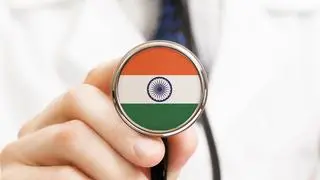An organ transplant racket — allegedly involving surgeons and other medical professionals in Delhi NCR hospitals and foreign nationals — has been unearthed by Delhi police, leading to the arrest of seven people, including a 50-year-old doctor.
According to sources, the accused have links with Bangladesh and charged ₹25-30 lakh for each transplant. Both donor and receiver were from Bangladesh.
The racket has allegedly been in operation since 2019.
The arrested doctor, identified as Dr Vijay Kumari, was reportedly associated with at least three hospitals. The accused have been charged with forgery of medical and other documents, including blood test reports.
The sources said Kumari had performed transplants allegedly at Yatharth Hospital in Noida, while she was associated on a “fee-to-case” basis with Indraprastha Apollo Hospital (IAH). Her PA is accused of forging the paperwork; the police have recovered fake documents and seals during their raids.
Kumari’s transplant records from Yatharth Hospital were seized, while crime branch officials also questioned Apollo Indraprastha officials.
“The doctor is not associated with Indraprastha Apollo. She was not on our payroll. And we had cooperated with the police during investigations,” an IAH official said.
In a statement, IAH said it was previously approached by the Crime Branch for information, as part of an investigation, which was duly provided.
“The wider Apollo Hospitals Group has done more than 25,000 transplants and has followed all laws and processes in letter and spirit. Our processes have been reviewed by competent government authorities, who have upheld our record of compliance. At the same time, IAH will provide its fullest cooperation to investigative authorities on this matter,” the statement further said.
Yatharth Hospitals, too, denied any association with the accused.
“Yatharth Hospitals has no direct association with the said doctor, as she is part of some other hospital. We have cooperated fully with all investigations, and there have been no findings of wrongdoing against our hospital or our practices,” a spokesperson said.
Modus operandi
The racket involved luring patients or donors from a neighbouring country, forging documents including medical reports, and exchange of money between the recipient and the middlemen who arrange for organ donors, including sometimes the doctors who perform the surgeries. The major share of the proceeds went to the middlemen and the surgeon, and some to the donors.
Indian laws prohibit commercial dealings in human organs or tissues.
The police said 15-20 cases of illegal kidney transplant have come to light so far.
According to the officials, Bangladeshis were lured into India on the pretext of job offers and personal identity documents were forged to show them as Indians.
The donor received ₹5-10 lakh at the most, Delhi police sources said.
Last year, the Union Health Ministry had initiated a probe into a cash–for– kidney transplant racket involving foreign nationals (from Myanmar) and Indians and a reputed global hospital chain.
Earlier this year, the Director-General of Health Services (DGHS) wrote to the Director of Medical Education and Director of Health Services of all states and Union territories, asking them to direct the authority appointed under the Transplantation of Human Organs & Tissues Act (THOTA), 1994, to investigate transplants involving foreign nationals.
Organ donation and transplant regulation in India
Passed in 1994, THOTA is aimed at the regulation of the removal, storage and transplantation of human organs for therapeutic purposes, and the prevention of commercial dealings in human organs.
The basic rules allow near-relative donors, including mother, father, son, daughter, brother, sister, and spouse. Others can donate only out of affection and attachment, or for any other special reason, that too with the approval of the authorisation committee.
Multiple layers of approvals are required when it involves cross-border organ transplantation, sources in the medical profession said.
The organ donation process involving a living donor (as against cadaver organ donation) includes medical tests and other evaluations to confirm the donor’s medical compatibility with the recipient.
The surgically retrieved donated organs are briefly stored in chemical solutions before being transplanted into the recipient.
The living donor will need to remain under medical care for a few days or weeks after organ retrieval until she/he is fit to go home.







Comments
Comments have to be in English, and in full sentences. They cannot be abusive or personal. Please abide by our community guidelines for posting your comments.
We have migrated to a new commenting platform. If you are already a registered user of TheHindu Businessline and logged in, you may continue to engage with our articles. If you do not have an account please register and login to post comments. Users can access their older comments by logging into their accounts on Vuukle.